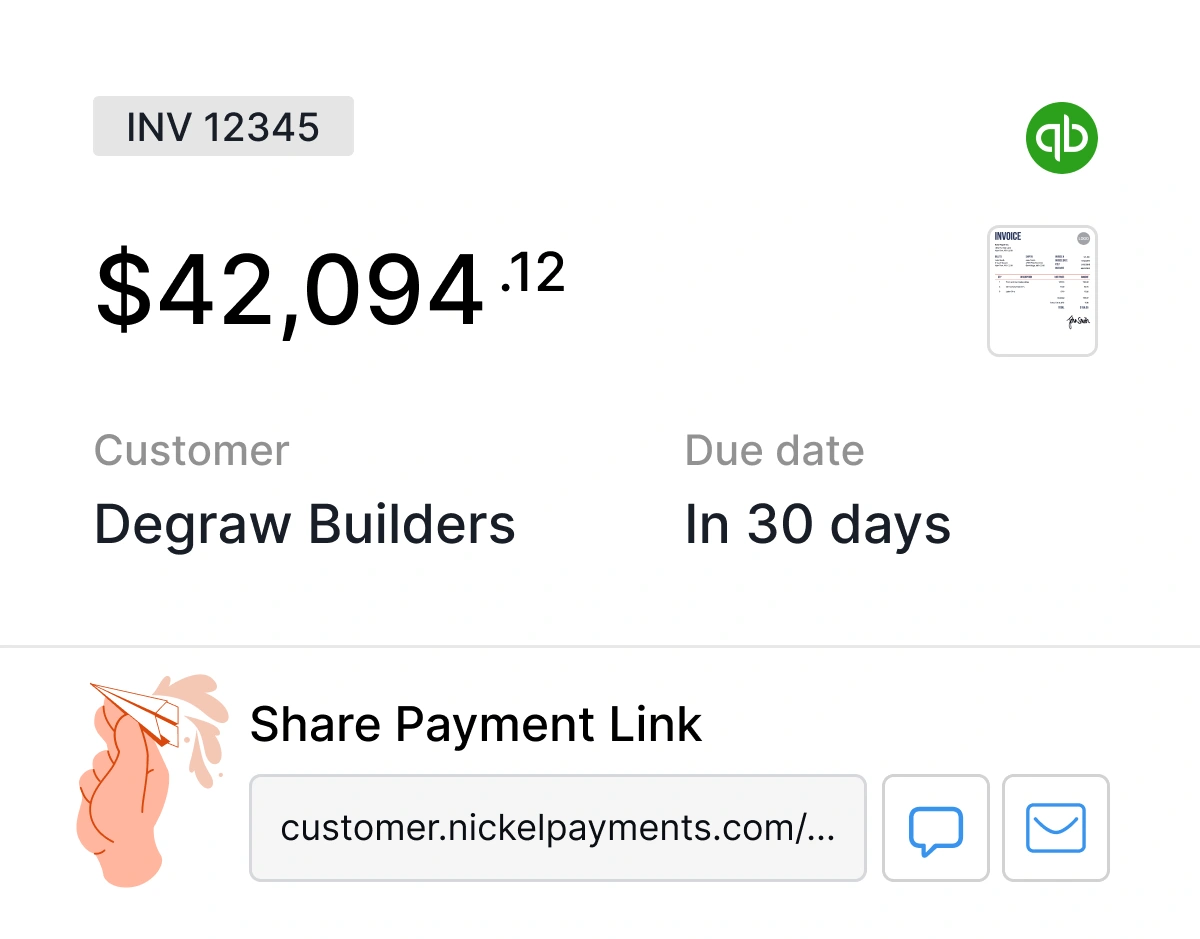The Payment Platform Built for Millworkers
Cut through payment friction with invoicing designed for custom woodwork professionals

Trusted by 10,000+ industrial small businesses














































Why Millworkers Are Switching to Nickel
Unlike traditional payment processors that treat you like a "high-risk" business, Nickel was built specifically for trade professionals who handle large invoice-based transactions. We understand that:
- $30,000 custom cabinet installations are normal business, not suspicious activity
- Large architectural millwork orders create payment surges that banks often flag as unusual
- You need reliable processing during peak construction seasons when demand spikes
- Your cash flow depends on predictable payment timing, not arbitrary holds
Result: No surprise account holds, no "business verification" delays, no risk department calls.

Why Millworkers Are Switching to Nickel
Unlike traditional payment processors that treat you like a "high-risk" business, Nickel was built specifically for trade professionals who handle large invoice-based transactions. We understand that:
- $30,000 custom cabinet installations are normal business, not suspicious activity
- Large architectural millwork orders create payment surges that banks often flag as unusual
- You need reliable processing during peak construction seasons when demand spikes
- Your cash flow depends on predictable payment timing, not arbitrary holds
Result: No surprise account holds, no "business verification" delays, no risk department calls.
Before Nickel vs. After Nickel
Multiple systems for invoicing, payments, and bookkeeping
Banks freeze accounts over routine $25,000 custom cabinet orders
Lose 1-3% on every transaction ($250-750 per typical job)
Banks don't understand millwork business patterns
Hours spent matching payments to invoices in QuickBooks
Everything integrated: invoicing, payments, and QuickBooks sync
We understand large and variable transactions are normal for millworkers and our support team is highly responsive if you ever run into issues
Keep 100% of what customers pay you
Designed around how your business actually works
Your invoices and payments automatically sync to the right customer, project, and job, plus seamless AP integration
Managing Cash Flow in a Custom Millwork Business
The millwork industry generates $33.7 billion annually across 10,409 businesses in the United States, with the majority being small operations handling everything from custom cabinetry to architectural woodwork. These businesses face payment challenges that generic processors weren't designed to handle.
Material Cost Volatility
Millwork businesses carry significant upfront costs before collecting payment. Wood windows and doors account for almost half of the industry's revenue, and material costs for hardwood and softwood dimension stock fluctuate based on market conditions and tariffs on Canadian lumber creating market uncertainty. When a single custom kitchen cabinet project requires $15,000-40,000 in premium materials purchased upfront, delayed customer payments can strain cash reserves.
Custom Order Complexity
Each millwork project is unique, requiring detailed specifications, custom measurements, and client approvals at multiple stages. This complexity often extends payment timelines beyond standard 30-day terms. Between initial deposits, progress payments, and final payment upon installation, 70% of small businesses hold less than four months' worth of cash reserves, making payment timing critical for operational stability.
Project-Based Revenue Patterns
Unlike retail businesses with consistent daily transactions, millwork shops operate on project cycles. A commercial storefront job might bring in $75,000, followed by weeks of smaller residential projects. Traditional banks see these revenue patterns as red flags rather than normal business operations, leading to payment holds when you need cash flow most.
Equipment and Technology Investment
Advancements in production techniques, such as integrating CNC (Computer Numerical Control) machining, have increased precision and reduced waste materials. However, this sophisticated equipment requires substantial capital investment. A quality CNC router costs $50,000-150,000, and financing these purchases becomes difficult when payment processors don't understand your industry's cash flow patterns.

Managing Cash Flow in a Custom Millwork Business
The millwork industry generates $33.7 billion annually across 10,409 businesses in the United States, with the majority being small operations handling everything from custom cabinetry to architectural woodwork. These businesses face payment challenges that generic processors weren't designed to handle.
Material Cost Volatility
Millwork businesses carry significant upfront costs before collecting payment. Wood windows and doors account for almost half of the industry's revenue, and material costs for hardwood and softwood dimension stock fluctuate based on market conditions and tariffs on Canadian lumber creating market uncertainty. When a single custom kitchen cabinet project requires $15,000-40,000 in premium materials purchased upfront, delayed customer payments can strain cash reserves.
Custom Order Complexity
Each millwork project is unique, requiring detailed specifications, custom measurements, and client approvals at multiple stages. This complexity often extends payment timelines beyond standard 30-day terms. Between initial deposits, progress payments, and final payment upon installation, 70% of small businesses hold less than four months' worth of cash reserves, making payment timing critical for operational stability.
Project-Based Revenue Patterns
Unlike retail businesses with consistent daily transactions, millwork shops operate on project cycles. A commercial storefront job might bring in $75,000, followed by weeks of smaller residential projects. Traditional banks see these revenue patterns as red flags rather than normal business operations, leading to payment holds when you need cash flow most.
Equipment and Technology Investment
Advancements in production techniques, such as integrating CNC (Computer Numerical Control) machining, have increased precision and reduced waste materials. However, this sophisticated equipment requires substantial capital investment. A quality CNC router costs $50,000-150,000, and financing these purchases becomes difficult when payment processors don't understand your industry's cash flow patterns.
Simplified Modern Workflow
Send invoice (or use your existing invoicing)
Customer pays instantly via secure link
Payment auto-syncs to QuickBooks
Money hits your account in 2 business days
Built-in QuickBooks Integration
Your payments automatically sync to the right invoice, customer, and job. No more:


Compare: Nickel vs. Other Payment Platforms
What This Means for Your Millwork Business
Save Money
Zero ACH fees: Save $4,000-12,000 per year on a typical millwork business No hidden costs: No setup fees, monthly fees, or surprise charges Early payment discounts: Pay and get paid faster, capture supplier discounts
Save Time
Automated reconciliation: 3+ hours per week saved on bookkeeping Instant invoicing: Send payment links directly from job sites One system: Stop switching between payment apps, banking apps, and QuickBooks
Reduce Risk
Process large payments worry-free: We understand millwork transactions and provide responsive support when needed Predictable processing: Money hits your account in 2 business days Secure payments: Bank-level security without the bank headaches
Millwork Industry Payment Breakdown
The $33.7 billion U.S. millwork industry has experienced some turbulence over the past five years, characterized by a slight decline in revenue, making efficient payment processing more critical than ever for survival and growth.
Market Fragmentation
With 10,409 businesses in the millwork industry, most operate as small businesses with fewer than 20 employees. These smaller operations lack the leverage to negotiate better payment terms with banks or processors, often getting stuck with high fees and restrictive policies designed for larger enterprises. When you're competing against both local custom shops and larger manufacturers, every percentage point in processing fees impacts your ability to remain competitive on pricing.
Project Economics
Custom millwork projects vary dramatically in scale and complexity. A residential built-in bookcase might generate $3,000-8,000, while commercial storefront millwork or restaurant build-outs can reach $50,000-200,000. Industry benchmarks show successful woodworking businesses generate $200,000 to $250,000 in sales per employee. When customers pay by credit card, standard processors charge 2.9-3.5% plus transaction fees, which on a $75,000 commercial project equals $2,175-2,625 in fees - money that comes straight out of already thin margins.
Material Supply Chain Pressure
Millwork businesses maintain relationships with multiple suppliers for hardwoods, softwoods, hardware, finishes, and specialty materials. Consumer demand for custom and sustainable millwork products has prompted manufacturers to adopt cleaner and cost-effective materials like engineered wood. Many suppliers offer early payment discounts of 2-3% for payment within 10 days, but only if you have the cash flow to take advantage of these terms. On $20,000 in monthly material purchases, these discounts could save $400-600 - but only when customer payments arrive on time.
Skilled Labor Challenges
The millwork industry requires specialized craftspeople who command competitive wages. Most businesses responding to industry surveys have been operating for more than 20 years, reflecting the expertise required to succeed. When customer payments are delayed due to processing issues or payment holds, meeting payroll for your skilled team becomes a constant source of stress. With more than 90% of small business revenue consumed by operational costs, payment timing can make the difference between making payroll comfortably or scrambling for short-term financing.

Millwork Industry Payment Breakdown
The $33.7 billion U.S. millwork industry has experienced some turbulence over the past five years, characterized by a slight decline in revenue, making efficient payment processing more critical than ever for survival and growth.
Market Fragmentation
With 10,409 businesses in the millwork industry, most operate as small businesses with fewer than 20 employees. These smaller operations lack the leverage to negotiate better payment terms with banks or processors, often getting stuck with high fees and restrictive policies designed for larger enterprises. When you're competing against both local custom shops and larger manufacturers, every percentage point in processing fees impacts your ability to remain competitive on pricing.
Project Economics
Custom millwork projects vary dramatically in scale and complexity. A residential built-in bookcase might generate $3,000-8,000, while commercial storefront millwork or restaurant build-outs can reach $50,000-200,000. Industry benchmarks show successful woodworking businesses generate $200,000 to $250,000 in sales per employee. When customers pay by credit card, standard processors charge 2.9-3.5% plus transaction fees, which on a $75,000 commercial project equals $2,175-2,625 in fees - money that comes straight out of already thin margins.
Material Supply Chain Pressure
Millwork businesses maintain relationships with multiple suppliers for hardwoods, softwoods, hardware, finishes, and specialty materials. Consumer demand for custom and sustainable millwork products has prompted manufacturers to adopt cleaner and cost-effective materials like engineered wood. Many suppliers offer early payment discounts of 2-3% for payment within 10 days, but only if you have the cash flow to take advantage of these terms. On $20,000 in monthly material purchases, these discounts could save $400-600 - but only when customer payments arrive on time.
Skilled Labor Challenges
The millwork industry requires specialized craftspeople who command competitive wages. Most businesses responding to industry surveys have been operating for more than 20 years, reflecting the expertise required to succeed. When customer payments are delayed due to processing issues or payment holds, meeting payroll for your skilled team becomes a constant source of stress. With more than 90% of small business revenue consumed by operational costs, payment timing can make the difference between making payroll comfortably or scrambling for short-term financing.
Ranked #1 Easiest to Use Payment Solution by G2
See why Nickel outranks every major competitor, including Forwardly, Melio, and Square
Get Started in Minutes
No contracts. No setup fees. No risk.
Sign Up (2 minutes)
Connect QuickBooks (1 click)
Start Getting Paid (immediately)

Ready to Fix Your Payment Problems?
Stop losing money to fees and time to complicated workflows. Join thousands of contractors who've already made the switch.








